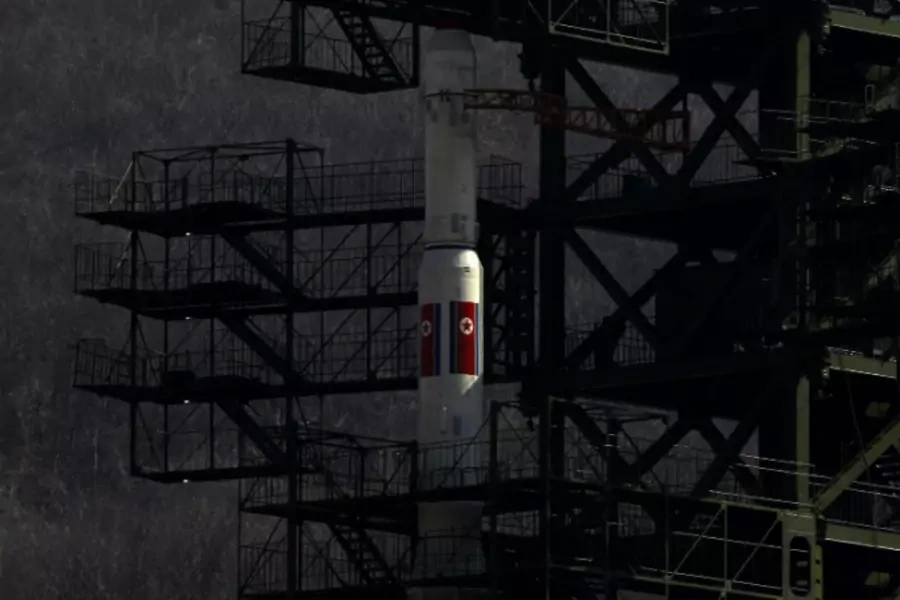More on:
The Democratic People’s Republic of Korea (DPRK) or North Korea successfully launched a multi-stage Unha-3 rocket from its Tongchang-ri launch facility on December 12 at 9:51 a.m. KST. About ninety minutes after the launch, the Korean Central News Agency reported that “the launching of the satellite ‘Gwangmyongsong-3’ using the “Unha-3” rocket was a success and that the satellite has entered into its planned orbit.” North American Aerospace Defense Command reported that “initial indications are that the missile deployed an object that appeared to achieve orbit.”
The DPRK’s success follows its failure to launch a satellite last April to commemorate the 100th anniversary of the birth of the regime’s founder, Kim Il-sung. The launch coincides roughly with the first anniversary of Kim Jong-il’s death on December 17. It is being credited as a major success within North Korea and will serve as an important symbol for regime consolidation under Kim Jong-un.
The task of responding to North Korea’s apparently successful satellite launch poses an immediate challenge to North Korea’s neighbors, each of which are in the middle of leadership transitions. The impending UN Security Council debate will come as an early test for China’s new leadership under Xi Jinping and as evidence that China’s comprehensive engagement strategy with North Korea has failed to restrain North Korean provocations. Since China’s overriding objectives toward North Korea remain stability and crisis avoidance, China will remain the main obstacle to any significantly punitive international response. It is likely only to agree to yet another ineffective UN presidential statement condemning the launch, resisting efforts to expand sanctions against North Korea.
North Korea’s satellite comes days before Japanese and South Korean voters go to the polls, raising the likelihood that national security will be on the minds of voters in both countries. LDP leader and likely next Japanese prime minister Shinzo Abe led the country’s strong response to North Korea’s 2006 rocket launch. His efforts resulted in the first UN resolution to criticize North Korean missile tests UN Security Council resolution 1695. South Korea has faced a long tradition of North Korean provocative actions designed to influence South Korean election outcomes, but it is unclear how a satellite launch could tilt South Korea’s electoral result in the North’s favor. The North has publicly opposed conservative candidate Park Geun-hye, but it is hard to say how a satellite launch helps opposition candidate Moon Jae-in or others who advocate a fast-track for reconciliation with the North.
A White House statement described the North Korean launch as a “highly provocative act” that would result in “consequences” for violating existing UN Security Council resolutions. However, the Obama administration faces a replay of the events of early 2009, in which North Korea answered President Obama’s outstretched hand of reconciliation in his inaugural address with an April 2009 satellite launch. North Korea greeted UN condemnation of that test with a nuclear test the following month. Last February’s Leap Day agreement lasted only sixteen days before North Korea announced its April 2012 satellite launch, and North Korea pledged more satellite tests in response to the UN statement condemning North Korea’s test. This time, President Obama extended an outstretched hand directly to North Korean leaders from Rangoon on November 19, only to have it slapped away twelve days later by North Korea’s December 1 announcement that it would undertake its latest launch. While a UN push to condemn North Korea’s defiance is inevitable, so is North Korea’s determination to assert its self-proclaimed right to peaceful use of space and to prove the UN feckless, perhaps by pursuing yet another nuclear test.
For two decades, North Korea’s nuclear push has been the single most effective catalyst for regional cooperation in Northeast Asia, yet North Korea is also the expert at exploiting differences among its neighbors. A North Korean satellite test may provide a basis for strengthened Japan-South Korea cooperation despite deepening differences over history and territorial issues. Further North Korean provocations may yet diminish strategic mistrust between the United States and China. If there is a common threat that should rightly overcome such mistrust and galvanize regional cooperation among the United States, Japan, South Korea, and China, it most certainly should be the prospect of a thirty-year old leader of a terrorized population with his finger on a nuclear trigger.
Scott Snyder is co-editor with Kyung-Ae Park of North Korea In Transition: Politics, Economy, and Society and author of China’s Rise and the Two Koreas.
More on:
 Online Store
Online Store

